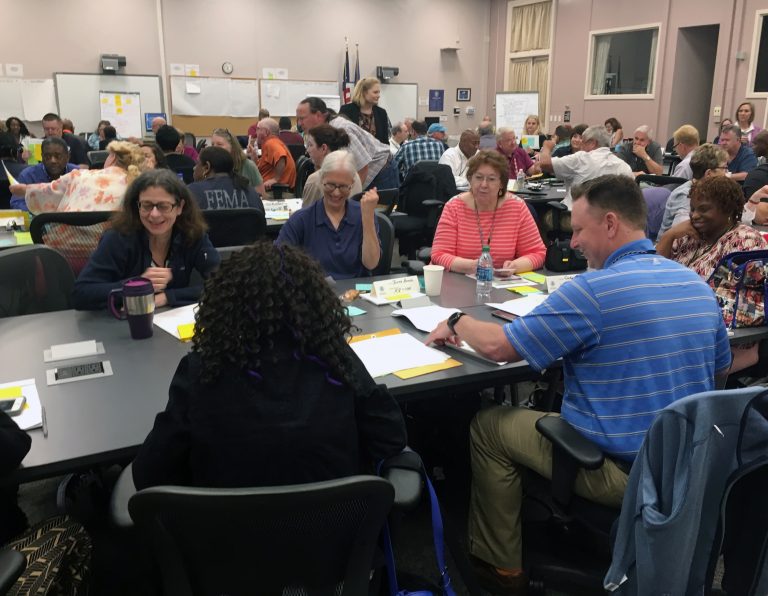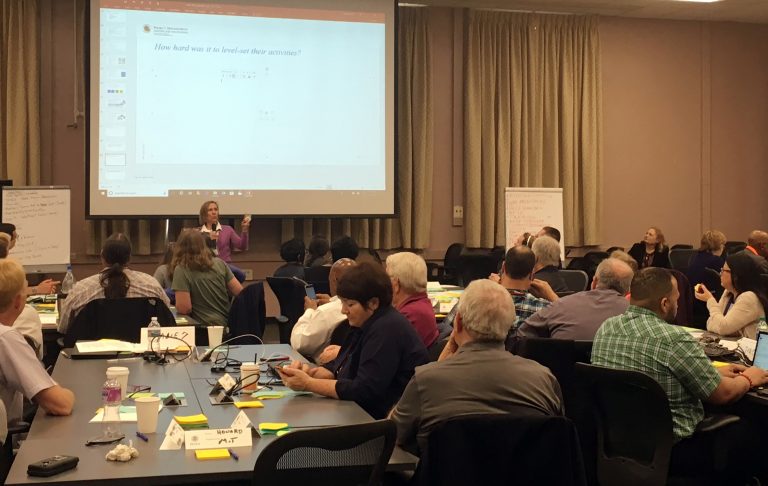Federal Emergency Management Agency (FEMA)’s Insurance and Mitigation Readiness Division (IMRD) worked with the University of Maryland’s Center for Disaster Resilience to lead a workshop, “A Project Management Framework for HM Disaster Functions,” on May 15, 2018, in Emmitsburg, Md. The training centered around introducing a framework for project management for Hazard Mitigation Disaster Cadre mid-level managers.

About 70 professionals, most of whom had recently been deployed to disaster-response sites around the United States, attended the training. The workshop helped identify current challenges and opportunities among individual roles and processes within the mitigation mission area, identifying priority areas that could potentially improve future delivery and performance. Many of the attendees could be redeployed to recovery areas.
In addition to Dr. Knight, instructors included University of Maryland’s Greg Baecher, Softek’s Don Bouchard and John Johnson and JoAnna Wagschal of Ideation, Inc.
“The workshop confirmed that implementing mitigation programs in a disaster environment is extremely difficult,” Dr. Knight said. “While the dedication to the mission by the mitigation cadre was extraordinary, there were plenty of areas where improvements in process, a focus on key activities and special training would make their efforts more enduring. We appreciated the opportunity to conduct this workshop and the genuine enthusiasm of the 70 professionals who attended.”
Training process

The workshop broke down practitioners’ jobs into functional areas: Community Education and Outreach; Grants and Planning; Floodplain Management and Insurance; and Hazards Performance and Analysis.
Participants shared all their current job activities to help identify opportunities for improvement, while learning about project management processes in layman’s terms to evaluate how well their current jobs align with the project management framework.
Training was broken into four learning sessions. The opening and closing were presentations and discussions with the whole class, first introducing project management and finally, looking at how it aligns with their jobs. The majority of the training was conducted in breakout sessions, where between eight and 10 participants – grouped by their respective functional areas – were given exercises to stimulate discussion. The disaster employees were first asked to identify all the activities they perform on a daily or weekly basis. Then they discussed the challenges and opportunities, landing on priority needs and a wish list of things they would change.
“The skills gained from this training will accelerate FIMA’s effort to have the right people in the right place at the right time,” said Kelly DeGraff, Director of FEMA’s Insurance and Mitigation Readiness Division. “Introducing project management to emergency managers will increase their ability to make sound, rapid and accurate decisions while having limited access to information.
“There is a shared history between project managers and emergency managers where both cope with changing environments and unexpected requirements. Project management before, during and after disasters can reduce hazards, guide recovery, support rebuilding and help to sustain community resilience.”

The training is part of a CRC project led by Dr. Knight, “Development and Testing of a Project Management Curriculum for Emergency Managers,” at the University of Maryland (UMD), which explores the opportunity to introduce project management skills in the emergency management community. The goal of the education project is to develop and test training and/or curricula that combine the challenges of emergency management with the capabilities and technologies introduced through project management processes to better manage the escalating costs and complex demands of natural hazards.
The project explored the goal through two distinct career lenses: Emergency management, which functions to protect communities and reduce vulnerabilities by mitigating and responding to hazards; and project management, the process of applying specific knowledge, skills, tools and techniques to meet project requirements. Project management tools include managing cost and schedules, preparing for change and mitigating project risks, maintaining quality assurance and quality control, while communicating expectations to those responsible for the projects and programs and those impacted by them.
In addition to the workshop for FEMA, a curriculum has been developed to support a concentration at the master’s and Ph.D.-level in the University of Maryland’s Civil and Environmental Engineering Department on resilient engineering. As part of the CRC project and as a part of the broader resilience curriculum, an introductory course, “Principles of Disaster Management,” was taught in the spring 2017 semester and will be offered biannually beginning in Spring of 2019.
Based on her research, Dr. Knight concluded that by adapting and using project management tools in emergency management, resilience goals can be achieved more efficiently. By correspondingly building disaster-resilience concepts and emergency protocols into project management, project managers will be better equipped to contribute to overall resilience.
